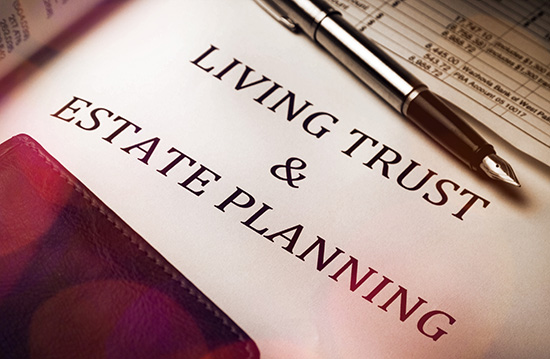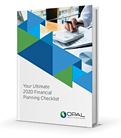What COVID-19 Means for Your Estate Plan
By Jesse Giordano, CFP® | April 15, 2020For many of us, the coronavirus pandemic is putting things in perspective—and triggering some pretty big questions on the individual level. With public health front and center during this dark time, many are looking inward and examining their own mortality. As such, estate planning seems to be on everyone’s mind right now.
It isn’t a topic that most of us like to think about, but it’s never been more important to get your financial house in order to ensure that your family is protected against whatever the future holds. Doing it right comes down to smart planning.

Communicate with Your Loved Ones Now
Open and honest communication during this pandemic is absolutely essential to estate planning. Otherwise, your family will be confronted with extra grief should something happen to you. On top of processing the emotional loss, they could be left sorting through your assets and debts while dealing with the headache of probate.
Bringing your spouse into the conversation is a crucial step so that you both have a full understanding of the plans that are being drawn up. It’s an emotionally charged topic, but working with a compassionate financial advisor who understands you and your values can make it a whole lot easier. Some questions to consider include:
- Am I protected if something happens where I can’t advocate for myself? What about my family?
- If the unthinkable happens and income stops coming in, how will my bills be managed?
- How will my family access my bank accounts?
- If I’m incapacitated, who will speak to doctors on my behalf?
- Do I have a long-term care plan in place? Or a disability policy? If so, does my family know how to handle these?
- If something happens to someone I love, what are my responsibilities for stepping up for their family?
At the end of the day, estate planning is one component of an overarching wealth management plan. Having these conversations with your family and other key people now is crucial in carrying out your wishes later.
Periodically Update Key Documents
Your estate plan isn’t static, but rather a fluid reflection of your values. This is why it’s so important to periodically update key documents as you grow and change throughout your life. Keeping your will and beneficiaries (including contingent beneficiaries) up to date is vital in making sure your assets are distributed the way you want them to be. Life insurance policies and retirement accounts should be on this list. It’s wise to add beneficiaries to your bank and brokerage accounts, as well.
You’ll minimize red tape by avoiding probate as much as possible. Setting up a revocable living trust can help you do just that. You can make changes to this type of trust whenever you want, which may include dropping or adding beneficiaries, or tweaking how the assets are eventually distributed. Upon your death, revocable living trusts are processed outside of probate.
Another action item is making sure your health care power of attorney and durable financial power of attorney are fresh. This step is essential, especially in light of COVID-19, should you find yourself in a circumstance where you can’t make decisions for yourself. For example, if you specify that no artificial life support is to be used, that could potentially include a ventilator. You can discuss these types of nuances with your legal advisor.
Now is a good time to think about what you want for yourself—then get it firmed up in writing and make sure your loved ones know where your estate planning documents are located. The Opal Wealth Organizer or Opal Wealth Access Vault are ideal for storing critical documents.
One other thing: take the time plan for any minor children in your care so that there aren’t any hiccups in custody. It’s also an opportunity to communicate with your siblings about their plans for your nieces and nephews. Is the paperwork in order for you to step in and assume custody if you had to? Again, it’s a grim thought but one we have to address.
Make a Plan for Your Business
If you’re a small business owner, you’ll also want to think about what will happen if you or one of your partners becomes unable to make business decisions due to the coronavirus. One other thing to consider is that should you pass away, your estate will also have to cover a “death tax” that could add up to half of your business’s value. This could force your beneficiaries to sell and take a loss in order to pay it. In a nutshell, estate planning should involve communicating with business partners and shareholders.
Make Sure Your Parents Are Taken Care of
Older people are among the most vulnerable when it comes to the coronavirus. It may feel awkward to ask your parents about their financial situation, but that doesn’t mean it isn’t a conversation worth having. Connect with your siblings and tackle it together. What do your parents’ income and expenses look like? Do they have enough to make it through all of their retirement? And who will be responsible for managing their affairs if they become unable to do so themselves? Another point to consider is if their estate plan is in line with their wishes.
These are big questions, to be sure, but an empathetic financial advisor who’s skilled in estate planning can curb the intimidation and help you create an action plan. What matters most is that your estate plan is clear and easy for people to execute, and that all your important documents are accessible in one location.
At Opal Wealth Advisors, we understand that emotions often come into play when estate planning; even more so during a pandemic. But we’re seeing firsthand that being prepared and having your documents in order has never been more important. Contact us today and take the first step toward getting organized.
Be a Smart Investor
Stay up-to-date with industry-leading information and news delivered straight to your inbox.
Get our timely insights delivered to your inbox (Blog)
Please remember that past performance may not be indicative of future results. Different types of investments involve varying degrees of risk, and there can be no assurance that the future performance of any specific investment, investment strategy, or product (including the investments and/or investment strategies recommended or undertaken by Opal Wealth Advisors, LLC [“OWA]), or any non-investment related content, made reference to directly or indirectly in this commentary will be profitable, equal any corresponding indicated historical performance level(s), be suitable for your portfolio or individual situation, or prove successful. Due to various factors, including changing market conditions and/or applicable laws, the content may no longer be reflective of current opinions or positions. Moreover, you should not assume that any discussion or information contained in this commentary serves as the receipt of, or as a substitute for, personalized investment advice from OWA. OWA is neither a law firm, nor a certified public accounting firm, and no portion of the commentary content should be construed as legal or accounting advice. A copy of the OWA’s current written disclosure Brochure discussing our advisory services and fees continues to remain available upon request or at www.opalwealthadvisors.com. Please Remember: If you are a OWA client, please contact OWA, in writing, if there are any changes in your personal/financial situation or investment objectives for the purpose of reviewing/evaluating/revising our previous recommendations and/or services, or if you would like to impose, add, or to modify any reasonable restrictions to our investment advisory services. Unless, and until, you notify us, in writing, to the contrary, we shall continue to provide services as we do currently. Please Also Remember to advise us if you have not been receiving account statements (at least quarterly) from the account custodian.



